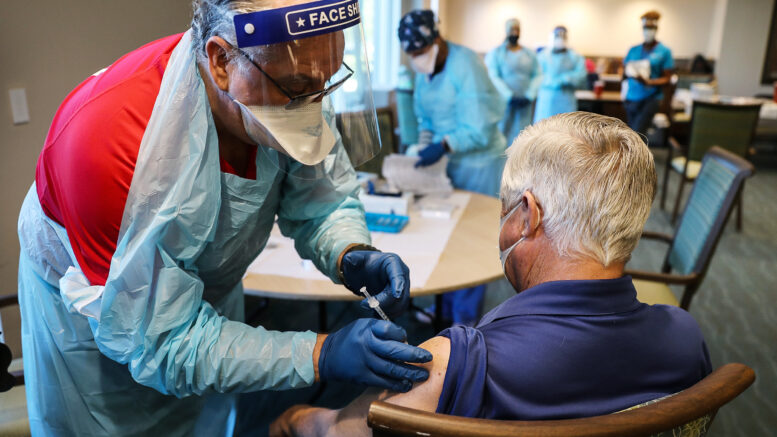More than $125 million has been allocated in the state budget for nursing education for the 2022-2023 fiscal year primarily to fund two new programs, Gov. Ron DeSantis and State Surgeon General Dr. Joseph Ladapo announced Monday.
The bulk of the funding, $100 million, establishes the Prepping Institutions, Programs, Employers, and Learners through Incentives for Nursing Education (PIPELINE) program. A smaller amount of $25 million helps establish the Linking Industry to Nursing Education (LINE) program.
PIPELINE financially rewards colleges and universities for their nursing education programs, based on student success. LINE provides funding to schools to recruit faculty and clinical preceptors for their nursing programs to address a shortage of nursing instructors. LINE funds are matched dollar-to-dollar by health care partners in their communities.
Overall, the funding goes toward student loan reimbursement and scholarships for nurses, expands infrastructure at colleges and universities that provide nursing education, and provides salary and recruitment incentives for nurses within the Department of Veterans Affairs. It was approved in the state budget, which DeSantis recently signed into law.
“We are investing in quality nursing education to increase the number of programs and jobs that prepare students for careers in nursing,” DeSantis said. “Florida’s nurses stand ready to serve their communities every day, and we will always recognize the importance of this vocation. There has long been a need for nurses in Florida, especially as our state is growing, and we want to continue to support these front-line heroes.”
“Nurses comprise the nation’s largest health care profession, and in Florida we will always have their backs,” the governor said.
“Those states that decided to part ways with nurses who opted out of a vaccine, like the one I came from, were incredibly disrespectful towards nurses,” Ladapo said. “I have always appreciated nurses and their partnership, especially as a medical student who didn’t know what they were doing. Nurses are super people who create positive outcomes for their patients. This additional funding will yield nothing but good things for our invaluable nurses.”
DeSantis announced the new programs and funding for them at Seminole State College in Sanford. A recent graduate from the school, Raeanne Champion, said, “With the nursing shortage we have now, it is the perfect time to invest in our state’s nursing programs. This funding is a pivotal step to attract the skillful individuals we need to keep pushing the nursing profession forward.”
She chose to enter the nursing profession at a challenging time for her family – when her grandfather was in the ICU on life support, she said.
“I was in contact with the most caring and empathetic individuals when deciding his care, and I decided I wanted to make a positive impact on people’s lives,” she added. “I have done just that by delivering babies, performing rapid response, and providing post-mortem care.”
Shawn Molsberger, president of Orlando Health South Seminole Hospital, said the hospital’s partnership with Seminole State College is helping students who want to become nurses and “to combat the nursing shortage and support the overall health care of this rapidly growing region.”
“At Orlando Health we are finding patient sitters and nursing assistants who want to move forward to become a nurse but are facing barriers to take that step,” Molsberger said.
According to a recent report published by the Florida Hospital Association and the Safety Net Hospital Alliance of Florida last fall, Florida is projected to have a nursing shortage of roughly 59,000 by 2035 due to more nurses leaving the profession than entering it. This includes 37,400 RNs and 21,700 LPNs, according to estimates.
Florida would need to add an additional 4,000 more nurses to the state’s workforce every year over the next 15 years to reach an adequate staff level by 2035, the report estimates.
Its key suggesting solutions to increase classroom and clinical training opportunities were addressed by the state budget, which provides unprecedented funding and creates the two new programs DeSantis highlighted.
“Nurses are an indispensable component of the safety and quality of care for Floridians in need and encounter the emerging health care needs of our citizens in a wide range of settings,” the governor stated in a proclamation issued earlier this month in celebration of May being National Nurses Month.
According to the Bureau of Labor Statistics, Florida has the fourth-greatest number of registered nurses in the U.S. There were 187,920 registered nurses in Florida as of May 2021.
This article was originally posted on More than $125 million to go to nursing education scholarships, expand clinical training at colleges, universities

Be the first to comment on "More than $125 million to go to nursing education scholarships, expand clinical training at colleges, universities"